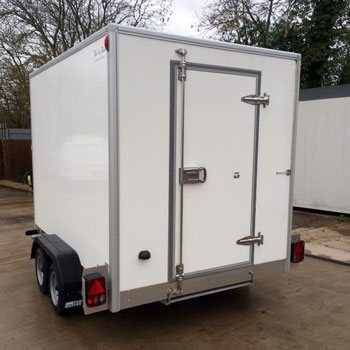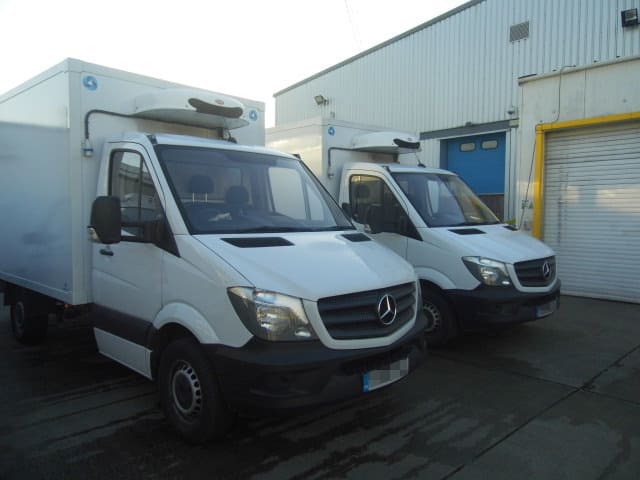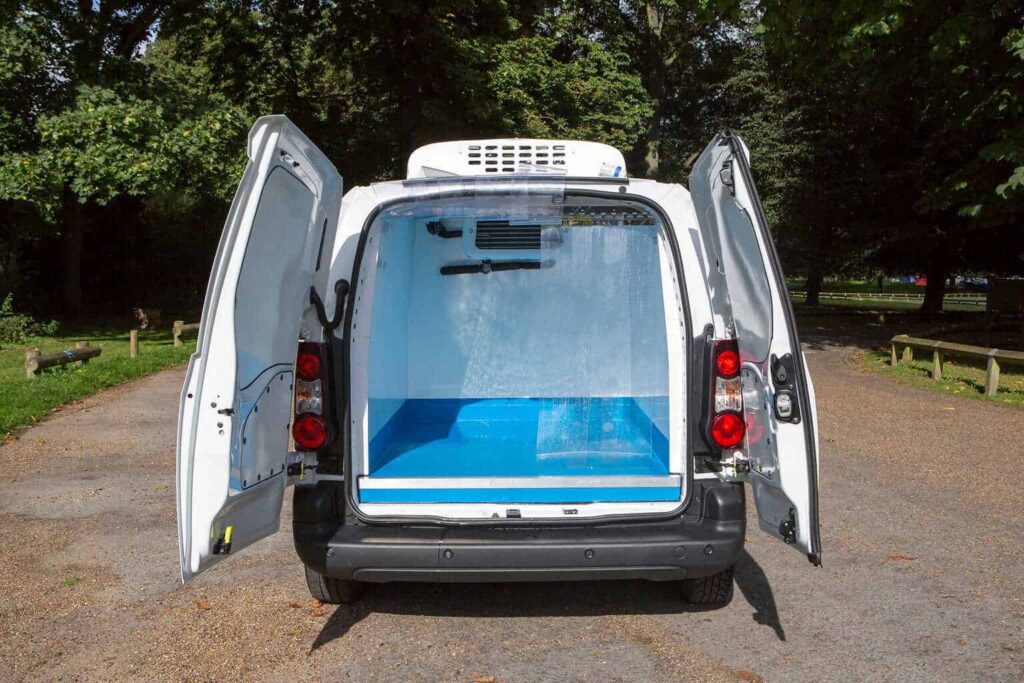Operating refrigerated vans is crucial for businesses that rely on the safe transportation of perishable goods. As a specialist in the hire, contract hire, and purchase of chiller, refrigerated, and freezer vans, FridgeXpress understands the intricacies involved in keeping your fleet running smoothly.
In this article, we’ll delve into the most common issues faced by operators of refrigerated vans, from damage during loading to the pitfalls of older models and discuss how building a partnership with a specialist service like ours can help keep your business functioning at full capacity.
General Wear and Tear in Refrigerated Vans
Whether you’re a small business with one refrigerated van or own a large fleet of vehicles, making sure your vans are in good working order is critical.
Refrigerated vans are often subjected to continuous use, regularly in challenging conditions, leading to general wear and tear over time. Understanding these challenges can help in maintaining the vehicle’s performance and longevity keeping your business up and running.
Here’s a detailed look at the areas commonly affected by wear and tear in refrigerated vans:
Body and Frame
The body and frame of a refrigerated van are its outer protection and structural support. Over time, these can suffer from:
- Corrosion: Exposure to moisture and road salt, especially in coastal areas or through winter conditions, can lead to rust and corrosion. This not only affects the van’s appearance but can also weaken structural integrity over time.
- Dents and Scratches: Regular loading and unloading, particularly in tight spaces, can lead to dents and scratches. While cosmetic, these damages can lead to rust if not addressed or repaired.
Insulation
Insulation is crucial for maintaining the correct internal temperature of a refrigerated van. Wear and tear can occur in the form of:
- Compression and Gaps: Frequent use can lead to the compression of insulation material. Additionally, gaps may form due to the settling or shifting of panels, allowing external temperatures to affect the internal environment.
- Moisture Ingress: Any breach in the van’s structure can allow moisture to enter, which can degrade the insulation and lead to mould growth.
Refrigeration Unit
The refrigeration unit works hard to keep the internal temperature regulated and is susceptible to:
- Component Wear: Compressors, fans, and other mechanical components can wear out over time due to continuous operation.
- Refrigerant Leakage: Vibration and regular use can lead to tiny fissures through which refrigerant can escape, reducing cooling efficiency.
Engine and Mechanical Parts
The engine and other mechanical parts are the workhorses of the van, and wear and tear here can have significant impacts:
- Engine Wear: Constant starting and stopping, especially in urban delivery environments, can lead to faster wear of engine components.
- Transmission Issues: Frequent shifting and stop-start driving can strain the transmission system.
- Suspension Stress: Carrying heavy loads regularly can lead to suspension wear, affecting the van’s handling and the stability of the cargo.
Electrical Systems
Modern refrigerated vans are equipped with sophisticated electrical systems that can experience wear and tear:
- Battery Degradation: The additional load from the refrigeration unit, especially if the van does frequent short trips, can lead to faster battery degradation.
- Wiring Issues: Vibration and moisture can lead to frayed wires or corroded connections, affecting everything from lighting to the refrigeration unit itself.
Tyres and Brakes
Tyres and brakes are critical for safety and are subjected to high wear:
- Tyre Wear: Heavy loads and frequent stops can lead to uneven tyre wear. Poorly maintained tyres can affect fuel efficiency and safety.
- Brake Wear: The stop-start nature of delivery work means brakes can wear down quicker than in other vehicles.
Interior
The interior of a refrigerated van can also show wear and tear:
- Flooring Damage: Regular loading and unloading, especially with heavy and sharp objects, can damage the flooring.
- Door Seals: Frequent opening and closing can wear out the seals, which are vital for maintaining the correct internal temperatures in your van.
Mitigating Wear and Tear
To mitigate these issues:
- Conduct frequent inspections to catch and address issues early.
- Follow a regular maintenance schedule for all parts of the van, especially the refrigeration unit.
- Address any damages, especially to the body and insulation, promptly to prevent further degradation.
- Train drivers in best practices to minimise wear and tear, such as gentle braking and careful loading.
Check out our blog: What is the Best Way to Manage Your Refrigerated Van Fleet?
Damage Caused During Loading and Unloading
The loading and unloading process is a critical time for refrigerated vans. During these operations, physical damage can occur, such as dents and scratches from forklifts or pallet jacks, particularly for larger vans.
These seemingly minor damages can lead to significant issues, including breaches in insulation that compromise the van’s temperature control capabilities. Furthermore, improper loading can cause uneven weight distribution, leading to mechanical strain and potential long-term damage to the vehicle’s suspension and chassis.
Fridge Unit Failure: Most Common Causes
The refrigeration unit is the heart of any refrigerated van, and its failure can lead to disastrous consequences for your perishable cargo. Common causes of fridge unit failure include:
- Power Issues: Inconsistent power supply or electrical faults can cause the unit to shut down unexpectedly.
- Refrigerant Leaks: Leaks in the refrigerant system can lead to a loss of cooling efficiency and can be caused by physical damage or wear and tear.
- Blocked Condensers: Debris and dirt can block the condenser coils, hindering the unit’s ability to expel heat and maintain the desired temperature.
- Thermostat Problems: A malfunctioning thermostat may lead to the unit overworking or not cooling sufficiently, affecting temperature regulation.
Van Breakdown
Breakdowns are a dreaded event for any vehicle, but for refrigerated vans, they pose an additional risk to the temperature-sensitive cargo. Common reasons for van breakdowns include engine issues, transmission problems, and electrical faults. Regular maintenance is crucial to identify and address these issues before they lead to a breakdown.
Reliability of Refrigerated Vans: Older Models vs Newer Ones
The age of a refrigerated van can significantly impact its reliability. Older models might not benefit from the technological advancements of newer ones, such as more efficient refrigeration units, better insulation materials, and more robust engines.
However, with proper maintenance, older vans can continue to serve effectively, though they may require more frequent repairs and might not be as fuel-efficient or environmentally friendly as their newer counterparts.
What to Do If Your Refrigerated Van Breaks Down
In the event of a breakdown, the immediate priority is to safeguard the perishable cargo. This may involve transferring the goods to another refrigerated van or using temporary refrigeration solutions.
It’s also essential to have a plan in place for roadside assistance and to know whom to contact for quick repairs. Having a robust support system, like the one provided by FridgeXpress, can significantly reduce downtime and the associated costs.
Here’s who to call if your van breaks down and you need a replacement.
The Importance of Basic Maintenance
Regular maintenance is vital for the longevity and reliability of refrigerated vans. This includes routine checks of the refrigeration unit, engine, transmission, and electrical systems, as well as ensuring that the insulation remains intact and effective.
Preventative maintenance can identify potential issues before they lead to breakdowns, saving time and money in the long run.
How Building a Partnership with FridgeXpress Can Keep Your Fleet on the Road
Partnering with a specialist like FridgeXpress offers numerous benefits. With a deep understanding of the unique needs and challenges of operating refrigerated vans, FridgeXpress provides tailored solutions, whether you’re looking to hire, contract hire, or purchase. Their comprehensive service includes:
- Expert Advice: Guidance on the best vehicles and configurations for your specific needs.
- Maintenance Support: Access to skilled technicians who can perform regular servicing and maintenance.
- Replacement Vehicles: Provision of replacement vans during maintenance to minimize downtime.
- Latest Models: Access to the latest and most efficient refrigerated vans on the market.
While the operation of refrigerated vans comes with its set of challenges, understanding these common issues and how to address them is crucial for maintaining a reliable and efficient fleet. Regular maintenance, being prepared for emergencies, and building a partnership with a dedicated specialist like FridgeXpress are key strategies to ensure your refrigerated vans remain on the road, serving your business and your customers effectively.
Want to find out more about FridgeXpress?




